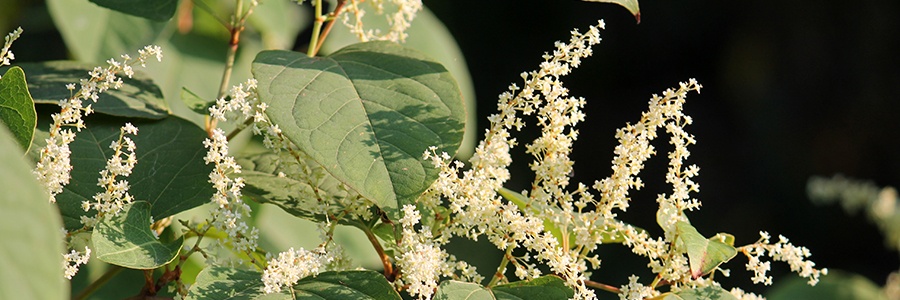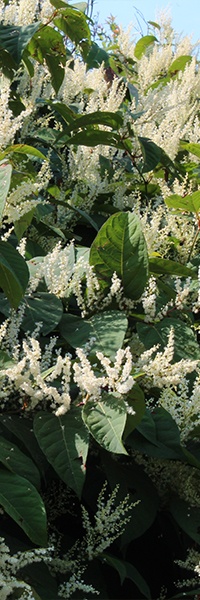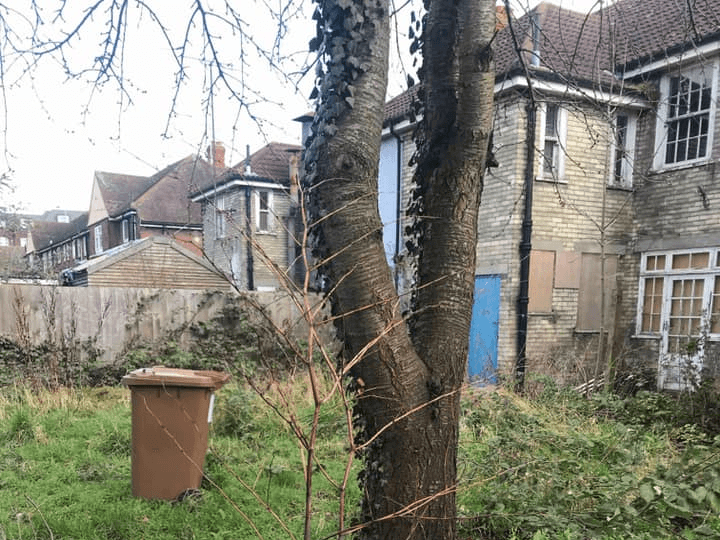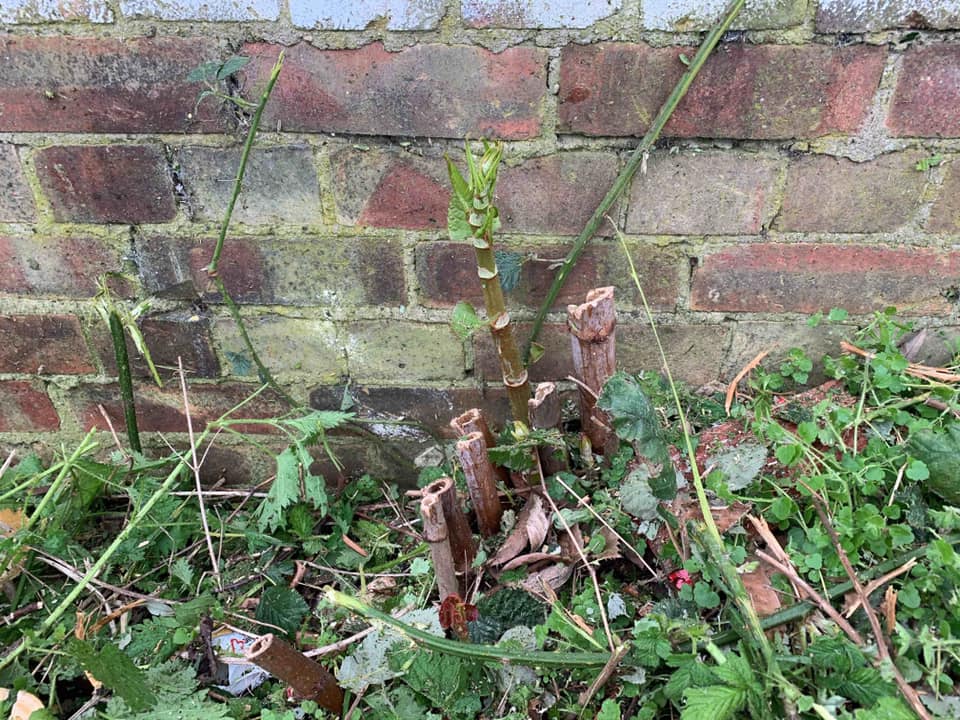Japanese Knotweed Removal
Essex and UK Wide
Are you looking for Japanese Knotweed removal in Essex or throughout the UK?
Do you need to find a solution for how to get rid of Japanese Knotweed?
We are involved in controlling invasive weed and general vegetation works. Kingsfield Environmental offer a twenty-years insurance guarantee.
How To Get Rid Of Japanese Knotweed
Japanese Knotweed is one of the most invasive weeds that has caused huge losses when invading gardens or buildings. In fact, in the UK, Japanese Knotweed costs the economy about £160 million each year in property devaluation and treatment.
Do you need to find a solution for How To Get Rid Of Japanese Knotweed? We are involved in controlling invasive weed and general vegetation works, so if you are suffering from Japanese Knotweed growth, please contact us today.
Kingsfield Environmental has been handling invasive weeds for more than a decade, so we have the knowledge and experience needed to get rid of the Japanese Knotweed and give you the best advice on preventing it from growing again. We offer a twenty-year insurance guarantee to provide our customers with the peace of mind they deserve.

Why is Knotweed so bad?
A common Knotweed could grow up to 10cm per day and is an invasive species. Due to this extreme growth from the Japanese Knotweed, it has been known to cause some damage by attacking the weak points of building structures and substructures. Some weak points can be cracks within the masonry, and the Knotweed attempts to grow through these cracks and damaging the structure.
Also, the spread of Japanese Knotweed is rather difficult to control due to its growth speed, so proper maintenance must be kept in check. Among other issues, the Knotweed is often known to damage aquatic life with its roots by creating cracks in the structure of riverbanks, and the leaves are known to damage the native vegetation of other plants.
Is it illegal to have Japanese Knotweed in your garden?
Having a Japanese Knotweed in your garden is definitely not illegal; however, having one can cause disputes with a neighbour. If you grow the Japanese Knotweed inside your garden, you must ensure that you keep it under control by performing regular maintenance on it. Knotweed does tend to go underground and past the property borders, and you can be liable to removal costs and any damages that the Knotweed has caused. Controlling Japanese Knotweed is very difficult, which is why many do not allow them in their garden.
Under the Wildlife and Countryside Act, it is illegal to allow any Japanese Knotweed to grow wild. So, if the Japanese Knotweed grows beyond your borders and control(such as into common ground owned by the government), you must alert the council or local authority about this issue.
Steps to take to prevent Japanese Knotweed
To stop the spread of Japanese Knotweed, you can make a few preparations. These include:

Plant Looks: Understanding what the plant looks like is important. Many plants can look the same, and you should not get confused, so understanding what it looks like will help prevent its growth and spread. If the plant is caught early, this might save you some money depending on how far it has spread and what damage has been caused by it. This type of plant dies back its roots and leaves during winter and grows again or creates new shoots in Springtime.
Treatment: Understanding that the plant is the Japanese Knotweed is important, but the treatments are also important for any affected areas. There are several ways to treat the Knotweed, such as using weed killer chemicals(like glyphosate or herbicides) to cover the plant; however, allowing a specialist to kill the Japanese Knotweed is better for ensuring it is done quickly possible reduce the amount of time wasted. Many professionals often have special chemicals that are stronger than normal weed killers; however, you cannot generally get these. Cutting the plant up or burning will not stop this easily, which is why we usually suggest having specialists help remove the infestation of this weed. The Japanese Knotweed rhizomes or roots can go around 2 metres deep in the ground.
If you believe that the Japanese roots have grown into someone else's property, the best thing is to approach them and have it checked out. This can also reduce the damage it has done to any structures it has touched.
What to do if you have Japanese Knotweed
Even though eliminating Japanese Knotweed is possible, it requires high levels of skills and expertise because they have extensive rhizomes that can grow up to 4 cm in a day! Meaning that the weed can become dense in a short period if it not controlled in time.
To make matters worse, Japanese Knotweed can grow in most areas and requires only a small fragment of the rhizome to propagate (the rhizome fragment can be transported via footwear or through soil transportation). Therefore, if you suspect you have a Japanese Knotweed infestation, seeking professional help as soon as possible is highly recommended.
You shouldn't try and get rid of the Japanese Knotweed by yourself, as you will end spending more money in the long run, and calling a professional will avoid the stress and hassle associated with the removal of the weed.
Applying for a Mortgage with a House that has Japanese Knotweed
If you have Japanese Knotweed, applying for a mortgage can prove very difficult, affecting the property structure and has many other disadvantages. These disadvantages may make selling your property hard and may also lower the value of your property.
Japanese Knotweed grows aggressively, and it can affect the structural integrity of a house. This is because the Japanese Knotweed exposes the weaknesses of concrete, brick walls, foundation or tarmac. Some of the problems associated with Japanese Knotweed include the following:
- Reducing the value of the land
- Damaging flood defence structures
- Damaging paving, tarmac areas and retaining wall structures
- Damaging the foundation of a building
- Restricting access to a building
- Aesthetic issues
However, you don't need to worry, as we have many years of experience in getting rid of Japanese Knotweed and preventing it from growing again. Please get in contact with us today!

Eradication of Japanese Knotweed
Here at Kingsfield Environmental, we have been removing Japanese Knotweed using tried and tested methods for more than ten years all over the UK; we operate seven days a week.
We can eradicate this weed from both commercial and residential properties. Japanese Knotweed spreads very fast and in a short period. If you don't possess the right skills, experience and required equipment, you might end up spreading the weed further if you try doing it yourself.

The prices of eradicating Japanese Knotweed varies depending on the infestation size and your location in the UK. Nonetheless, rates are from £1,200 + VAT for herbicide control options; our price includes the following services:
- Initial survey
- Japanese Knotweed management plan
- 5-season treatment or monitoring program as required (depending on the level of infestation)
- Lender approved insurance backed guarantee or day one issue
Japanese Knotweed Identification
Japanese Knotweed flowers later on in the year, between August and October, so this is probably the best time to check if you have it or not. The stems of this invasive plant are bamboo-like, and they have purple spots all over them, so they are pretty easy to spot. The stems themselves can reach heights of up to 2-3 metres and not only affect your garden but also the wildlife.
The flowers on the Japanese Knotweed plant are small and are a creamy colour. They flower in groups and can be found where the leaves meet the unique and recognisable stem. If you are unsure if you have Japanese Knotweed, please give us a call or send us an email. We will be more than happy to come and look for you and give you the advice you need.
Our Japanese Knotweed Treatment Company
Our Japanese Knotweed treatment is effective and great for preventing the plant from growing back in the future. We use a wide variety of methods that have all been proven to work efficiently, effectively and reliably.
The treatment we use will depend on the location of the Japanese Knotweed growth and the severity of the growth. Here are a few of our main ones:
Herbicidal Spraying:
This method is used when there is no risk of polluting or harming anything, and requires 4 applications.
Soil Screening:
This method involves digging the Japanese Knotweed out of the soil, and disposing of it.
Root Barriers:
This method involves installing a root barrier under the soil, and it prevents the Japanese Knotweed from growing through tarmac and driveways.
Herbicidal Stem Injection:
This has proven to be the method that works best, and involves injecting the stem of the Japanese Knotweed.
Are you Looking for Japanese Knotweed Removal Companies?
Are you looking for reliable, professional and efficient Japanese Knotweed removal companies? Look no further because we have been removing Japanese Knotweed for over 10 years and have expert and extensive knowledge and experience. Not only do we remove the Japanese Knotweed for you, but we can also give you advice and solutions of how to prevent the Japanese Knotweed from growing back again, with a 20-year warranty, to provide you with peace of mind.
We only use the latest and best treatment to ensure the Japanese Knotweed goes away and won't return. We also provide these professionals, efficient and expert services to our customers at an affordable price. If you would like to find out more information or even a free quote, please get in contact with us today, and we'll be happy to help and advise you.
Frequently Asked Questions
About Japanese Knotweed Removal
Find out more about Japanese Knotweed Removal from our frequently asked questions. If you require any further information, feel free to get in contact on .
Japanese knotweed is an invasive plant species that spreads rapidly and can cause significant damage to buildings, roads, and gardens. Its strong root system can penetrate concrete, foundations, and drainage systems, leading to costly repairs. It grows quickly and is difficult to eradicate, making professional removal essential.
Japanese knotweed has distinctive features, including red-tinged shoots in spring, heart or spade-shaped green leaves, and hollow, bamboo-like stems. It produces small white flowers in late summer and can grow several metres tall. During winter, its stems die back but remain standing as brown canes.
Japanese knotweed is highly resilient and can regrow from small fragments of its roots. DIY removal is often ineffective and can lead to further spread. Professional removal services use specialised treatments, such as herbicide application or excavation, to ensure complete eradication and prevent regrowth.
Under the Wildlife and Countryside Act 1981, it is illegal to allow Japanese knotweed to spread into the wild. Property owners may also be held liable if the plant spreads to neighbouring properties. Mortgage lenders often require a professional management plan before approving loans for properties affected by Japanese knotweed.
The cost of removal varies depending on the severity of the infestation, the chosen removal method, and the size of the affected area. Professional treatment plans can range from a few hundred to several thousand pounds. Some companies offer insurance-backed guarantees for added security.
The most effective removal methods include herbicide treatment, excavation, and root barrier installation. Herbicide treatments take multiple applications over several years, while excavation involves physically removing the plant and affected soil to prevent regrowth. A combination of methods is often recommended for long-term results.
Yes, Japanese knotweed can cause structural damage by growing through cracks in concrete, walls, and drainage systems. It can also weaken foundations and cause issues with driveways and patios. Early detection and treatment are crucial to minimising damage and preventing costly repairs.
The timeframe for removal depends on the method used. Herbicide treatments typically take between two to five years to fully control the plant, while excavation can remove it in a matter of days. However, ongoing monitoring is essential to ensure complete eradication.
Many professional removal companies offer guarantees ranging from five to ten years, ensuring that if the plant regrows, further treatment will be provided at no extra cost. Some also provide insurance-backed guarantees, which can be beneficial for property sales and mortgage approvals.
Yes, but you must disclose its presence to potential buyers. Many mortgage lenders require a professional knotweed management plan before approving a mortgage. Having a specialist treatment plan with a guarantee can improve your chances of selling the property without issues.
Contact Us
If you would like to find out any more information about our Japanese Knotweed removal services, then please don't hesitate to get in contact with us today.
We work with homeowners throughout Essex and the whole UK.
You can get in touch with us via phone call on or by sending us an email.
A member of our team will be happy to answer any of your queries and questions.
.png)

